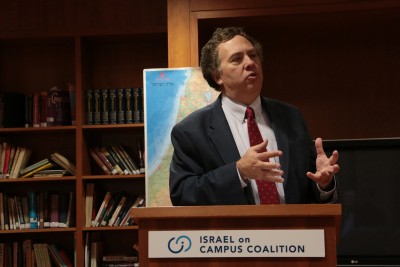
As conflicts in the Middle East amplify, it’s important for college students to start having healthy discourse surrounding the issue, David Makovsky, director of the Project on the Middle East Peace Process, said in a lecture to Boston University students Tuesday.
Makovsky was part of Secretary of State John Kerry’s peace team, which focused on conflict resolution between Israelis and Palestinians. Approximately 35 BU students convened at The Florence and Chafetz Hillel House to attend the event, which is the first of Hillel’s Conversations and Performances with Leaders of Israel and the Middle East series.
“It’s the message that counts,” Makovsky said before the lecture started. “Don’t divest, invest. Invest in relationships, invest in the two-state solution. Invest in bringing people together.”
Makovsky, now the Ziegler distinguished fellow at The Washington Institute, said part of the burden of bringing peace lies on the shoulder of university students.
“There are heroic people out there who have dedicated their lives to the idea of coexistence,” Makovsky said. “What we need are ways to bring students together, not tear them apart. If Israelis can talk to Palestinians, surely on BU’s campus, Jewish students and Muslim students can sit together.”
The world needs to tackle conflicts in the Middle East for two reasons, Makovsky said. One is the stagnation of conflicts will eventually lead to radicalization.
“If we are paralyzed on this, people will look for more radical solutions, either Hamas or elsewhere,” Makovsky said.
The other reason is the youth needs to become hopeful again to a peaceful future, Makovsky said.
“In these ups and downs of the rollercoaster [of international relation], I’ve at least experienced the ups,” Makovsky said. “Some of you weren’t even born [before the conflicts] … I don’t want to see the new generation of Israelis, Palestinians or Americans to give up.”
Several student attendees said the presentation introduced the bigger picture of Middle East, while others said they agree with the importance of having a dialogue in universities.
Matthias Grenon, a junior in the College of Arts and Sciences, said he attended the event because he was curious why the United States has a “peculiar climate” for conversations about Middle Eastern, specifically related to Israel or Palestine, issues.
“What I don’t understand is the absence of real dialogue and real debate,” he said. “Especially in the western world, people don’t really familiarize themselves with post-World War II history and the context. We need to start with education. From there, we can eventually tease out what the common ground is. Just being able to appreciate the problem in the first place may be the start to solving it.”
Hannah Jacobs, a freshman in the Sargent College of Health and Rehabilitation Sciences, said she went to the event because of her involvement in Israeli student organizations.
“I’m a member of the Students for Israel and [I’m] a Jew,” Jacobs said. “When I got here, [I was] surprised to feel the animosity on campus. I like the idea of collaborating on different projects on campus and making a lot of connections with students from other groups on campus from different backgrounds.”
Rachel Small, a sophomore in SAR, said she had prior exposure about the issue before coming to the event and she liked having dialog with not only the speaker, but also fellow students.
“I was raised hearing a lot of speakers on Israel, and coming here, it is so important to me to keep engaging and challenging my own thoughts and listening to other people,” Small said. “When people are talking about sensitive issues, it’s necessary to peel back the layers and know what is actually being said.”






















































































































